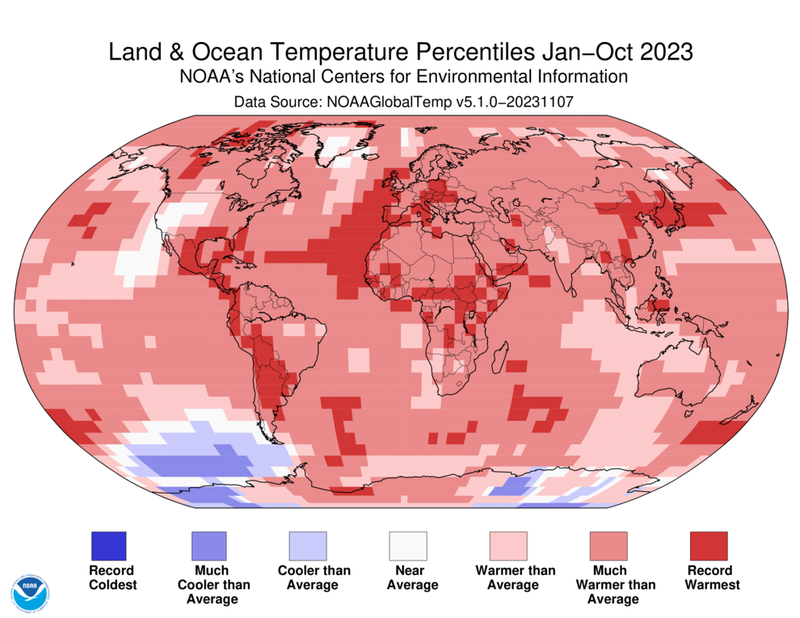Scientists have confirmed that with a few weeks left in the year, 2023 will be the hottest year on record.
University of St. Thomas (St. Paul) climate scientist Dr. John Abraham says his own research being published next month found the same result. He adds that it will break the previous record by a significant margin. Abraham and his colleagues published a similar paper at the beginning of this year as well.
"The reason why the temperature in 2023 was so hot is mostly due to human caused emissions, greenhouse gases that trap heat in the atmosphere," says Abraham. "And in addition to that, we happen to have an El Niño happening, which is something that happens in the Pacific Ocean that gives a little extra juice to the temperature."
While El Niño can influence weather, it generally is going to affect precipitation more than the temperature in the most cases, although some warming is expected thanks to a stronger humid and warm Pacific influence. It's hardly enough to cause the high average temperatures we experienced worldwide in 2023.
"Although almost anything can happen in a given winter, El Niño or La Niña can tilt the odds in favor of a particular outcome, meaning that those hundreds of predictions may lean in a certain direction," says NOAA climate writer Nat Johnson. "Additionally, the stronger the El Niño, the more likely the U.S. winter precipitation pattern will match both the average of the computer model forecasts and the typical El Niño precipitation pattern. Because there are higher chances in certain outcomes (e.g., a wetter winter), the presence of El Niño can help users assess risk and make plans."
During an Niño, the Pacific Northwest would still see those "atmospheric rivers". Minnesota might be unseasonably warm in December. But the added factor climate change is making those events more "extreme" according to scientists.
The United Nations weather agency said last week that beyond 2023, there are worrying trends that suggest increasing floods, wildfires, glacier melt, and heat waves in the future.
The World Meteorological Organization also warned that the average temperature for the year is up some 1.4 degrees Celsius (2.5 degrees Fahrenheit) from pre-industrial times – a mere one-tenth of a degree under a target limit for the end of the century as laid out by the Paris climate accord in 2015.
The WMO secretary-general said the onset earlier this year of El Nino, the weather phenomenon marked by heating in the Pacific Ocean, could tip the average temperature next year over the 1.5-degree (2.7 degrees Fahrenheit) target cap set in Paris.
“It’s practically sure that during the coming four years we will hit this 1.5, at least on temporary basis,” Petteri Taalas said in an interview with the Associated Press. “And in the next decade we are more or less going to be there on a permanent basis.”
WARMING OCEAN
Worse than air temperatures are the ocean temperatures. Abraham explains that most of our warmed up climate ends up in the water.
“If you want to measure global warming, you want to measure where the warming goes, and over 90% goes into the oceans," Abraham says. "Measuring the oceans is the most accurate way of determining how out of balance our planet is. We are getting more extreme weather because of the warming oceans and that has tremendous consequences all around the world.”
The amount of excess heat buried in the planet’s oceans, a strong marker of climate change, reached a record high in 2022. Then this past summer, scientists measured the hottest temps ever recorded in the world's oceans.

THERE ARE SOLUTIONS
Professor Abraham says everyone can do their part by making the switch away from coal and gas, to wind and solar energy. He says most utility companies provide this option and all it takes is a phone call, or signing up for wind or solar power online.
"In actuality, the solution is pretty straightforward," Abraham tells WCCO. "What we need to do collectively, both in the United States and around the world, is reduce our emission of greenhouse gases. That's mainly due to fossil fuel burning and methane release. Now, fortunately, it's not that hard to reduce our emissions. We can transition from coal and gas to clean forms of energy like solar and wind. And what we're also finding is that technology has advanced so quickly that wind and solar is just as cheap as coal and gas and in many cases cheaper. So, we're at a point in our history where we can save the environment by switching to clean and renewable energy, but we can also save money."
Abraham adds that there are many small things you can do to reduce waste, such as turning off lights when not needed, buying a car that is electric or gets better high gas mileage, and making sure your home is properly insulated.
“We have to reduce our consumption of coal, oil and natural gas dramatically to be able to limit the warming to the Paris limits,” Taalas said. “Luckily, things are happening. But still, we in the Western countries, in the rich countries, we are still consuming oil, a little bit less coal than in the past, and still natural gas.”
“Reduction of fossil fuel consumption -- that’s the key to success.”
The Associated Press contributed to this story.
